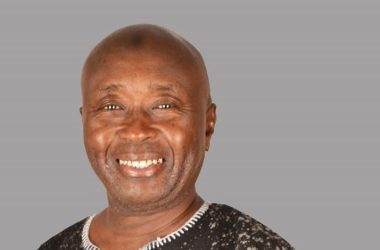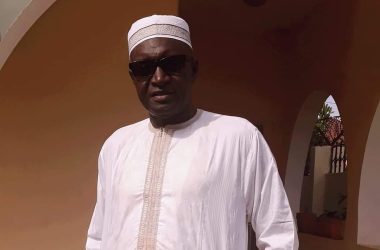 (JollofNews) – Fatou Jaw Manneh is a refugee, currently living in Arizona, USA. She has lived in America for more than 10 years. During her early years, she worked as a journalist in her home Country Gambia.
(JollofNews) – Fatou Jaw Manneh is a refugee, currently living in Arizona, USA. She has lived in America for more than 10 years. During her early years, she worked as a journalist in her home Country Gambia.
Gambia which was once called the, ‘Smiling coast of Africa,’ today is going through an unspeakably dark phase at the hands of its brutal dictator Yahya Jammeh who seized power through a military coup in 1994.
While speaking at the Oslo Freedom Forum she informed the world about the brutalities that the Gambian people are made to go through every day. “Dictators are like natural disasters to world citizens. Gambia and its citizens suffer more from our President Yahya Jammeh than we ever will suffer from fire, flood, famine, drought, or disease. So how do we defeat tyranny?,” she queried in her effort to call global citizens to join hands against such tyrannical governments.
In her exclusive interview, with the Oslo Times International News network, she spoke about her time in a Gambian correctional facility, the brutalities and torture Gambians go through everyday, Human Rights issues plaguing the country and a whole lot more.
The excerpts below give us an insight into the frightful occurrences Gambian nationals face at the hands of a brutal dictator:
The Gambian government arrested you in 2007 and detained for your statement made in an interview with the Gambian newspaper, ‘The Independent’, in 2004. During your detention what were the things that you hated the most and that you felt were against your rights?
Well, they arrested and detained me for six days before taking me to court. I was dumped in a mosquito-infested room for six days and night during which I slept on the floor and my whole body was red and swollen due to mosquitoes bite. Most Gambians, after they get arrested are beaten and tortured seriously and spend months if not years before they are charged with anything. I went through series of interrogations, but I was lucky for being not tortured like my countrymen.
I am from a small and once peaceful country called Gambia. But just exactly as I had stated in the “The Independent Interview”, these military boys who took over in 1994, contrary to their promise of good governance, have turned out to be nothing but a bunch of greedy, misguided, bullies who have invaded Gambia’s democratic space. President Jammeh is a cruel leader who spares none on his road to power for securing the eternity mantra. His government has no respect for the rule of the law. He is killing, jailing, torturing and threatening innocent Gambians by dragging them to the courts for just instilling fear in them of him.
I hate it that he cares less about empowering the institutions that should be the guiding blocks for rule of law, order and fairness in a democracy. He has proved himself to be is a misfit for any modern nation. All he believes in is the bullet and his never ending and insatiable desire for money. He is corrupt and cruel to the core. Yes, I hate all of that.
President Jammeh, is known for his iron-fisted system of governance, and still Gambia is considered probably the most stable country in that region. In this context, can you describe the entire scenario including the state of press freedom, the progress made by the nation over the years and conditions that still looks very bleak in Gambia?
The press and journalists are the most tortured and have always been victimised by the Yaya Jammeh government. Yaya Jammeh was, and has been able to muster every facet/institution of governance to his wishes in Gambia except for the Gambian press, though it remains the worst victim of Jammeh government rule. He wants every Gambian to drumbeat and chant behind him, but naturally press freedom is not about that.Therefore, he clashes with the press all the time. Presently also there is serious press censorship in the country but they (journalists) are doing their best to stay afloat and bring out the truth. He has introduced severe sedition and false information laws that aim to paralyze the work/role of the press. Severe fines and jail terms await every journalist or newspaper that falls under preview or becomes a victim of the predatory laws.
Actually the adjusted Information and Communication Act 2009 which was passed by the National Assembly inBanjul on July 3 – allows for a fine of D3 million (about USD $100,000) or imprisonment for fifteen years or to both fine and imprisonment – to anyone convicted of using the internet to spread false news about the Government or public officials. From this, can you imagine? Can you imagine how cruel this Gambian dictator is?
Could you tell us about your personal website the Maafanta.com and the kind of work you do through it?
Oh! Maafanta is just an opinion blog. I started it upon my return from the trial, to share information with like-minded people within the country and with the Diaspora, and to expose the dictatorship and horrible situation that the Gambian people are facing on a daily basis.
Firstly years of civil unrest in the West African region and the current Ebola virus have seriously brought the entire region in serious crisis. The epidemic threatens to further throttle the region’s economic and social stability. How has this regional turbulence affected Gambia and the Human Rights Situation there?
Thank God. Gambia and Gambians have not seen any Ebola yet. However, this does not mean that Gambians, at home and abroad, are not bracing up to face this catastrophic epidemic. Ebola is dangerous and is a community-threatening epidemic. West Africa has been devastated by the epidemic, because, as you know, the governments there were and have been, never ready to counter an epidemic of such magnitude. Malaria has killed many Africans.
The Bill Gates Foundation is doing well in trying to curb that epidemic. African governments and their corrupt officials use the power and the government funds to bring up their personal situation to the best, but neglect anything that has to do with the general populace.
There are not enough hospitals to respond to such epidemics, in terms of resources or health personnel. So any of such threatening health issue goes beyond control because these communities lack the facilities, resources and health workers that can counter them. Bad infrastructure including roads to hinterlands makes it tough for any health worker or organization to appear on time or control the spread of such epidemics
These epidemics have been devastating economically, as tourist activities are shunned to West Africa unless such diseases are cleared. Guinea, Gambia and Senegal are all attractive tourist destinations for travelers in general but the Ebola scare is tougher to scare them away.
Last year President Jammeh announced Gambia’s departure from the Common Wealth. Lot of critics have alluded this departure to the country’s criticism-filled reputation on human rights in the international sphere. What do you feel about this move and what consequences do you think Gambia will face as a consequence of it?
It is really a shameful act. President Jammeh bashes the West every day, but he is still very obsessed with everything Western. Gambia is not colonized by any western country today and this is contrary to what he wants the people to believe. Pulling out of the commonwealth means that Gambia and Gambians now cannot benefit from the exchanges of ideas between the commonwealth members states, especially access to scholarships offered to the young Gambians to study abroad, strengthening, and improving health facilities, and of course assistance assured on security of the nation. The world is getting more and more complicated. In such context, the more friendly relationship a nation builds with other nations the more they benefit each other in terms of education, health and security issues. The more tolerant and inclusive they become as they better understand each other and extend mutual help in times of needs.
Radicalization is becoming a common phenomenon across the world and in the context of Africa it is not a new scenario. Places where people are most unsatisfied with their lives are frustrated and are more prone to embrace extremism. So how can be radicalization curbed in impoverished societies?
Yes, radicalization is not new phenomenon in Africa, even after the end of slavery. Africans, fought, stood up against colonialism and slavery. Africans were exhausted from the era of colonialism. Imagine countries like the Congo? What King Leopold did to that country and its people, is inexplicable. I cannot imagine that any foreign power or leader can be so cruel as to the magnitude of King Leopold. He was worse than Hitler. Africa suffered a lot from slavery, only to fall under their ‘liberators’ cum brutal African leaders—worst personas in the continent than the colonial masters. Africa is a tired continent, but there is hope. The young are re-energized. With education wisdom and guidance, Africa shall rise again like the Phoenix.
Religious extremism is creeping into the African nation states and it is threatening communities in Nigeria and Kenya and some pockets in the horn of Africa because of our fragile borders, cowardice and greed of African leaders and hopelessness prevalent among the youths. But religious extremism will never have a stronghold in Africa. Africans respect and value the co-existence between various religious factions and they lived peacefully side-by-side before Christianity and Islam took over. We will hear religious skirmishes here and there in Nigeria and in the horn of Africa, but I refuse to believe that African people will fall for religious extremism. Yes, but a new wave of revolution is needed to steer the ship, save Africa from this knucklehead leaders, calling themselves liberators. That form of extremism or activism is ripe and much needed.
As a Gambian political activist living in the United States of America can you tell us about the kind of racial discrimination African Americans are facing? Well,
Well, America has its dark past, as every other country. But Americans are more tolerant now than they used to be. Yes, African Americans still lag behind in education, and standard of living in general and economic welfare. But opportunities are there for Americans in general to grab, work hard and improve themselves. Barack Obama is a Black President and his wife is also Black. And blacks did not put him in power but all Americans who believe in fairness did. Obama sold his message, and American people who believed him and voted him as President. These voters did not see Obama as an African American, but received him as a smart, eloquent and caring person and therefore voted for him. This would not have happened some five or six decades ago. The Americans have come a long way. They are more tolerant and considerate nowadays than their ancestors. They are not perfect but have made a lot of improvements and taken huge strides in improving race relations. And you have brilliant African American leaders, strong and intelligent, who kept paving for improved relations with Afro Americans.
From Frederick Douglas, Martin Luther King, Malcolm X, Thurgood Marshall to Condoleezza Rice, Halle Berry, Colin Powel, Stokely Carmichael, and countless others that fought and paved the way for African-Americans to reach the center stage. Many others continue to do so in many different ways. Each generation has its own dynamic leader. Barack Obama, Jesse Jackson, Charles Rangel, Melissa Harris-Perry, Rev Al Sharpton are some of the great leaders of their times.
In recent years how have White Supremacy groups and hate groups like the KLU-Klux-Klan and Army of God affected the rights of migrant populations in the United States of America?
None that I know of, from the White Supremacy groups. Am sure they exist but no immigrant in America goes to sleep fearing some white supremacy group is coming after them. Our fears are when to regularize our papers, how to get into Universities, how to compete for corporate jobs. All this takes long for an immigrant, but when your status is regularized you have to duke it out like any other American to go to school, work hard and help families. Threats in America come from terrorism, big banks, and access to health and education.
What has your experience been of the Oslo Freedom Forum? How do you think it will help you in your cause to resist the current dictatorship government in your country?
The Oslo Freedom Forum is one of the best gatherings for human rights defenders around the world. It is a gathering of do-gooders around the world. It’s a coming together of tough sad stories from around the world, but equally tough and resilient people countering and exposing tyrants and bullies around the world. It is jam packed with workshops and seminars that have opened my eyes to a whole lot of strategies, and experts in all fields coming from around the world. The support has been overwhelming. I cried a lot after my speech. Yes, fighting tyranny is tough but it feels good when an organization like The Freedom Forum recognizes your work, what you do, gives you a pat on the back, and open doors to help your cause that are unimaginable. It was an epiphany for me. The founders and all the boys, men and women around that organization, are efficient, kind, generous and caring. They completely washed away all the remnants of fear that drag or bog down freedom fighters around the world. These are very rich big boys and girls who could have been doing something else, but choose to spend their money, time and expertise in exposing tyranny, tyrants and bullies around the world. Good people congregate together and help each other and that is the essence of the Oslo Freedom Forum. I had a lengthy chat with the Chairman, Garry Kasparov and I have not yet seen men and women so dedicated to make better human lives and human rights around the world so far— from Germany to China. It was great and I am humbled. There could not be a better company. I came out of it energized, ready with all the information, contacts, and zeal. We shall continue to roll. I feel blessed and will follow up to the Tee.
Any message for our readers?
Yes. Journalists are well known to stand by each other in times of adversity. The Oslo Times Chief Editor approached me after my speech with a warm welcome and smile, and a firm handshake. The paper is the only English or the biggest English news site/paper in Norway/Oslo.
I want your readers to understand that Gambia like Norway is a small and peaceful country. Gambians want to work hard, stay well, and live together in peace and harmony. Gambians are suffering from a terrible dictatorship of a lunatic, paranoid, brutal and misguided leader in the name of President Yaya Jammeh. Oslo is a great city and I
cannot explain the hospitality I received. Unfortunately, it was a short trip. Thanks to the government of Norway for the wonderful support to the Freedom Forum and to all the participants. I met Parliamentarians who are warm, inviting and sympathetic to the plight of Gambia. We had a great dinner at the Estate of Kristian Siem. There I met lawyers, doctors, politicians and activists from the entire world. I say thank you Norway, thank you Oslo, to all the beautiful people of Norway and the bold activists I met from all over the world. I am appealing to the people of Norway, that Gambia is a beautiful tourist paradise. Help us get rid of a brutal dictator who is killing Gambians daily. The Gambian President is planning on crowning himself King and making Gambia an Islamist state. Can you imagine the complete control, brutality and cruelty if he manages to do that?? Time is against us and I am urging the Norwegian help rescue this beautiful country called Gambia. To all that came to the Freedom Forum sessions to I request them to help Gambia extricate itself from the brutal dictatorship. I am invited to speak at a University event in February. I am honored and I will be back inshalla. Thanks to Hatef and the entire staff of the Oslo Times. The struggle continues and God bless us all. Thanks to Oslo Times readers. Together we can make this world a better place.
Source: theoslotimes




